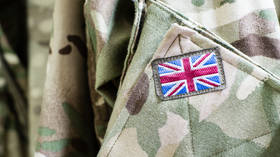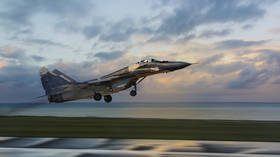British MoD bans personnel from going to Ukraine

The UK Ministry of Defence issued a statement on Wednesday prohibiting British service personnel to travel to Ukraine, at risk of disciplinary consequences.
“All Service Personnel are prohibited from travelling to Ukraine until further notice. This applies whether the Service Person is on leave or not. Personnel travelling to Ukraine will face disciplinary and administrative consequences,” the official MoD spokesman said, as reported by The Independent.
The official ban comes following reports that at least four British soldiers, including a 19-year-old Coldstream Guardsman, were missing and have allegedly gone off to join the fight against Russian forces in Ukraine.
On Tuesday, according to The Sun, a teenage Coldstream Guardsman voluntarily quit his service, wrote a farewell letter to his family, and booked a one-way ticket to Poland with the intention of crossing the border and joining the Ukrainian forces on the frontline, his friends suggested.
This has sparked fears among top-ranking military officials that a serving British soldier could cause a serious international incident if they were captured by the Russian military.
In February, British Foreign Secretary Liz Truss said she “absolutely supported” British people who were willing to go and fight in Ukraine in the wake of the Russian offensive, stating that “people can make their own decisions.”
Top-ranking British military officials, including Chief of Defence People Lieutenant General James Swift, and Defence Secretary Ben Wallace, later advised against British citizens traveling to Ukraine and joining the hostilities, citing the “very dangerous” situations that could lead to them being injured and killed.
The prime minister’s administration also contradicted Truss’ claims. Boris Johnson’s official spokesman said there were other ways to show support for Ukraine.
“We fully recognize the strength of feeling about British people wanting to support the Ukrainians following the Russian invasion. There’s advice up on travelling to Ukraine, we currently advise against travel to Ukraine,” the spokesman was quoted as saying.
On February 24, Russian troops crossed the Ukrainian border in what President Vladimir Putin described as a “special military operation” aimed at “demilitarizing and denazifying” the country. According to Putin, the Ukrainian government has been using force to oppress the Russian-speaking population of the Donbass, and the offensive was meant to protect them. Ukraine and its Western allies dismissed these claims as merely a pretext for “unprovoked” aggressive action against a sovereign state. In retaliation, numerous countries worldwide have imposed severe economic sanctions on Russia, as well as closing off their airspace to Russian aircraft.













